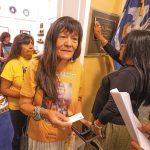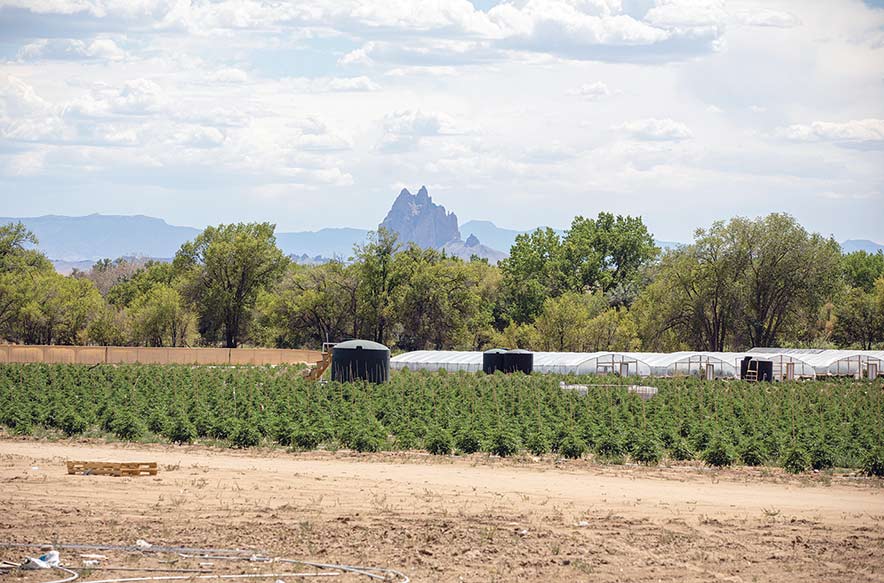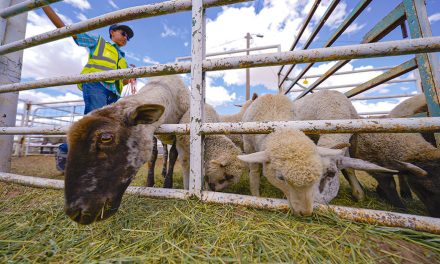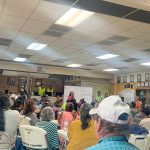
Injunction issued against hemp farms

Navajo Times | Sharon Chischilly
Shiprock rises behind a hemp farm owned by Dineh Benally.
Shiprock District Court Judge Genevieve Woody has granted a restraining order against Dineh Benally, owner of Native American Agricultural Company and Navajo Gold Company, allowing the Navajo Nation Police to begin shutting down his hemp farm operations and telling his workers to leave.
The Navajo Nation filed a lawsuit in June against Benally, who is president of the San Juan River Farm Board, and his companies seeking to stop “the illegal and unregulated growth, production, transporting, licensing, and selling industrial hemp within the exterior boundaries of the Navajo Nation.”
Woody’s decision comes a few days after the Navajo Nation Police issued a press release which described concerns and reports from Shiprock residents over Benally’s hemp cultivation.
It was summer of not only the pandemic but of community upheaval in the Northern Agency as Benally’s neighbors protested against his hemp production, the non-Navajo work force Benally had brought in and everything that came along with it.
During the first day of the hearing on the restraining order, the Navajo Nation’s special counsel, Charlie Galbraith of Kilpatrick Townsend & Stockton, called his witnesses – Oliver Whaley, director of Navajo Environmental Protection Agency, Navajo Chief of Police Phillip Francisco, and residents. They were cross-examined by Gallup attorney David Jordan, who represented Benally.
Near the end of the day, Jordan called two witnesses, one of Benally’s security guards and a farmer who was paid by Benally to use his farm to grow hemp.
On Friday they were supposed to call other witnesses and have them cross-examined, including Benally himself. But Jordan and Benally decided to rest and not to call any witnesses, and with that both counsels gave their closing statements.
“We had several witnesses yesterday and we went down some rabbit holes of he said, she said, play-by-play of what happened,” said Galbraith in his closing statement. “It was just a very small sampling of the daily confrontation happening because of this hemp.
“Conflicts are happening … daily,” he said. “They’re tearing families apart. They are a public health crisis … you heard Chief of Police Phillip Francisco call it a crisis situation.”
Galbraith said testimony such as Whaley’s show the environmental harm these unregulated hemp farms and hoop houses are doing to the land. Woody referred to Whaley’s testimony as fitting the requirement of irreparable injury, loss or damage to plaintiff’s rights and interests that would continue to occur unless a preliminary injunction is issued.
Whaley said he had observed violations of the Navajo Nation Pesticide Act because NEPA did not issue licenses for some of the pesticides used on the farm.
He also said septic tanks were installed on the hemp farm with no construction or operating permits. They were not being maintained and were leaking sewage, which posed a threat of contamination to the land, he said.
He added that sand bags had been installed to divert water from the San Juan River and was being investigated by the U.S. Army Corps of Engineers.
He said trash was being illegally dumped and onsite generators are attached to large water hauling tanks that he suspected contain gasoline to power the generators.
In Jordan’s closing statement, he said should a preliminary injunction be ordered, then Benally’s 2020 crop for nine farms would be “entirely lost.” There are 36 hemp farms that are so far identified.
“The plaintiff has completely forgotten their complaints,” said Jordan. “Their complaint had nothing to do with protesters, environment. It was CBD and hemp is illegal. It’s risky. It’s this and that. Things we didn’t hear anything about in their case. They didn’t even put on evidence of what my client is growing.”
Jordan said he had a problem with the “environmental guy” – Whaley – noting that NEPA has a procedure for issues that gives the offender a chance to fix the problem, after which they do a follow up.
“This case isn’t being brought by the Navajo Nation EPA,” said Jordan. “The Navajo Nation EPA isn’t asking for a preliminary injunction. Why? Because they have an entire remedy of law they are following. A procedure they are doing which gives my client a chance to address environmental concerns if they ask him.”
After the end of the hearing, local radio stations KGAK and KNDN broadcast interviews with farmers who had given up their farms for Benally to grow hemp on and farm workers who said Benally is a “good man” and that racial bias should not be an issue. During the hearing, Jordan accused the protesters of using racist epithets toward Benally’s mostly non-Navajo workforce.
“The negative things being said about him (Benally) is just racial comments,” said one woman who works for Benally. “How can we go against our own Navajo kind?
“Coming at the Asians, you guys need to think where does your clothes come from?” she said. “Where does your vehicle come from? Who are the ones bringing in the medicine? Who are helping the elderly? It’s the Asians who are here giving their time. We need to work together.”








 Highway 264,
Highway 264, I-40, WB @ Winslow
I-40, WB @ Winslow